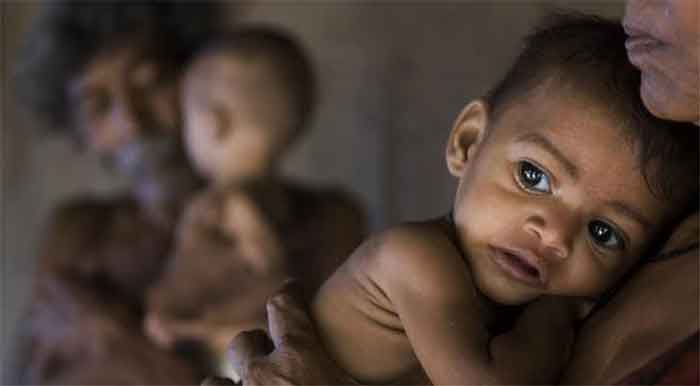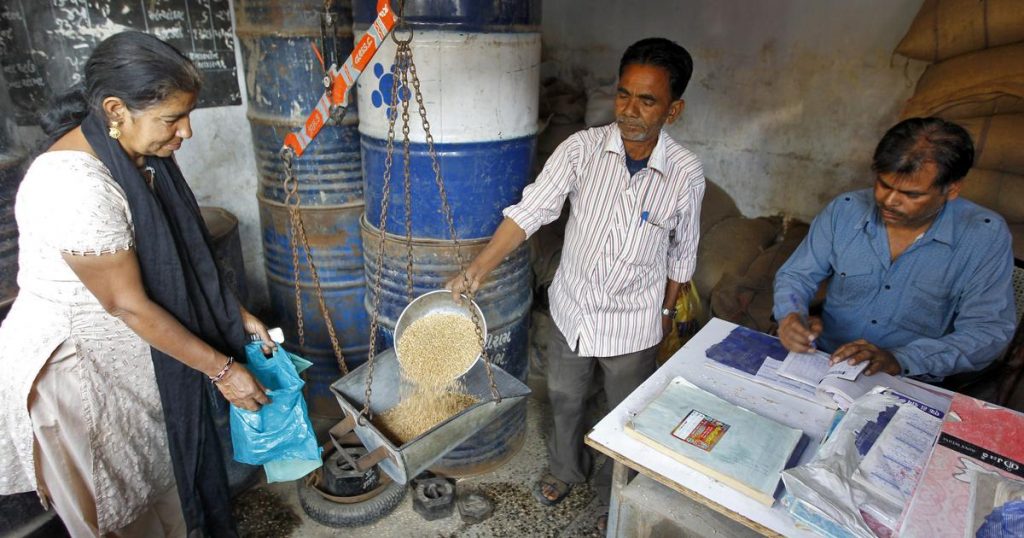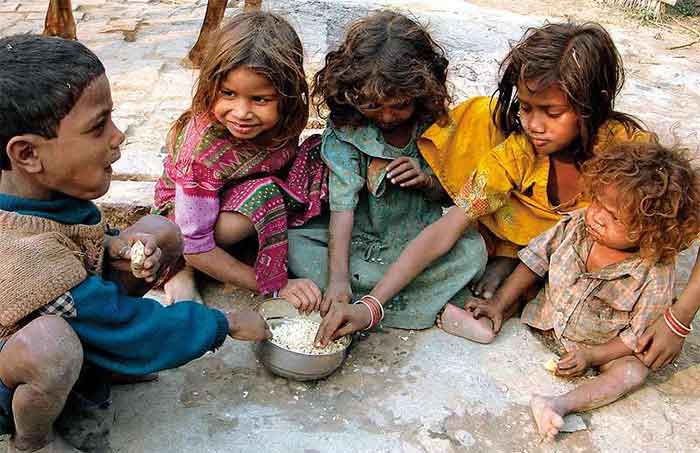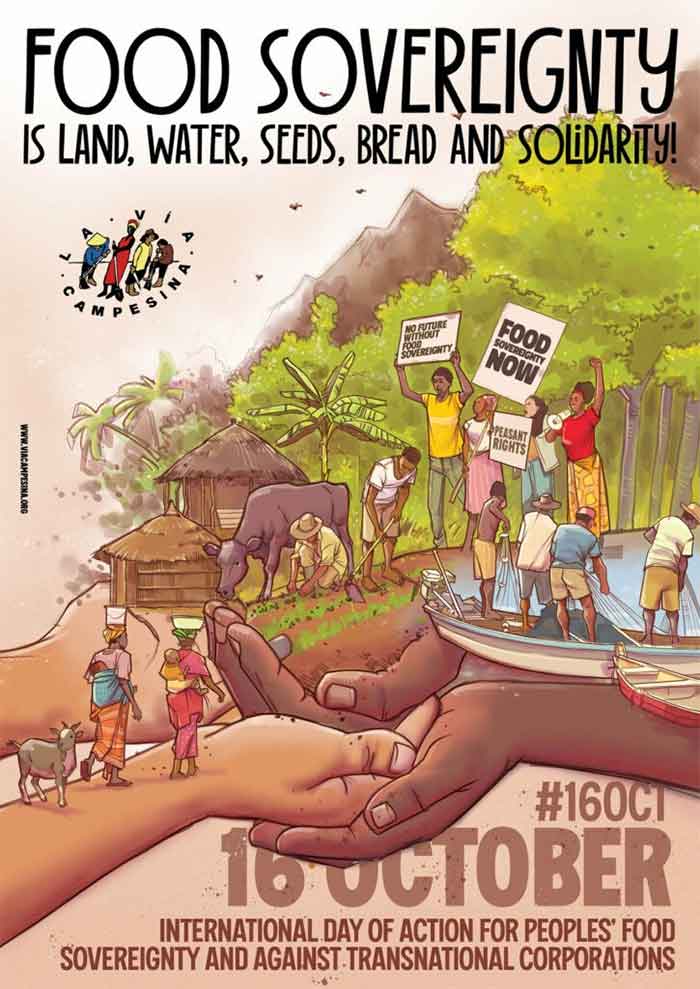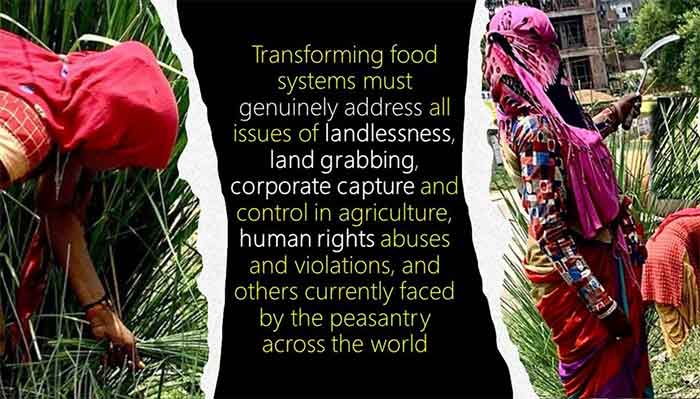A number of catchy slogans, melodramatic speeches in mask-less rallies of thousands, puerile arguments of insider- outsider, and of course the evergreen communal angles, Bengal is seeing it all. In the ongoing hullabaloo, it is imperative to talk elections in the context of real peoples’ real issues. The moral duties of an elected government to its people does not change or rather should not change with change in its flag’s colour, then why have the fundamental rights to food and work assumed irrelevant colours.
Krishna Mandal, the sole earning member of her household, never opted for the Ujjwala scheme since she was afraid that post the subsidies and free cylinders , she will not have the resources to carry on. The only money left in her household was being used for her son’s tuition. Krishna’s apprehension proved right when the central government recently proposed withdrawing LPG subsidies. It is another matter that Krishna’s son studying in class ten when the lockdown struck, decided to drop out from his studies by himself. “..Beshi shomoshya , chele ke o panch taka dite pari ni” (More problems, could not give my son five rupees also) says Krishna Mondal from her kachha house which was destroyed in Amphan and still awaits repair, where she lives with her son, jobless husband and aged widowed mother-in-law who has fallen only more sick in the past few months with almost no food availability and never haven seen a single old age or widow pension though it has been more than fifteen years that her husband passed away.
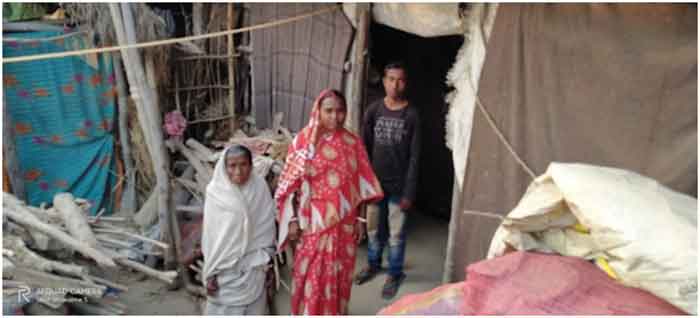
In Simalbari tea garden Rani Nagesia, a tea plucker, breathed her last few breaths shortly after retiring from work in April 2020 during lockdown. She was asthmatic and fell very ill a few nights before passing away. ‘All we needed was to get her some oxygen’ said Priya Nagesia, the elder daughter of the house who had left to work in Delhi but rushed back as soon as she could. Though her family wanted to take her to the hospital, there was no means of transport and the hospitals seemed completely inaccessible due to the Covid cases. A few days after her death, Rani’s son who was mentally handicapped , also passed away in shock. ‘We are not hopeful of getting any compensation from the tea garden or the government since both the deaths occurred in the house’ says a distraught Priya.
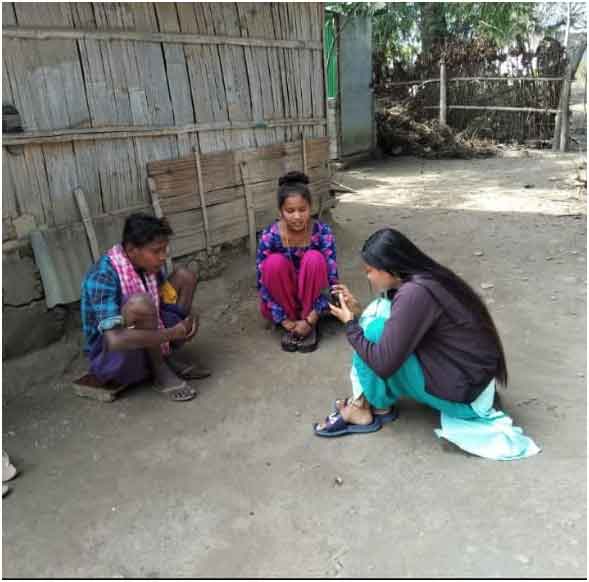
A largescale Hunger Watch survey covering over 3000 households across 20 districts of the state was conducted over the months of October- November 2020, in order to draw some ideas about the experience of hunger and other related hardships that the most vulnerable populations of our society faced during lockdown and even post lockdown. Hence an attempt was made to not only highlight the crisis period during lockdown but also understand how ‘normal’ were things post 3-4 months after. More than half of the respondents reported decrease in cereal and pulses consumption between pre and post lockdown periods. And as high as 68% reported decrease in vegetable consumption post lockdown while 80 per cent a decrease in their consumption of non-vegetarian items. These findings must be examined in the backdrop of already highly vulnerable and precarious populations, as the survey was conducted purposively with these groups, of which most reported earning between Rs 3000-5000 monthly and even lesser.
While one in four reported that their income reduced to half during lockdown, this rose to one in three almost, by the end of September.
‘Unforeseen circumstances call for unforeseen measures, and many times it has to be taken by a woman’- says a single mother working as a domestic help, Rakuli. Almost ten years back, Rakuli Debnath had returned from her husband’s house to her parents’ house in Behrempore, Murshidabad, due to the in-laws’ threats of burning her alive. Since then, she has not only coped with social stigmatisation aimed at her and her two children but has also gained economic independence as a domestic worker. Though there are her parents and brothers, but they are not very accepting towards her, and she has a small room built adjacent to their house, where she lives with her children. She had taken a loan from Bandhan Bank to build this small structure by herself.
Before lockdown she was working in 4 households but post-lockdown she lost two. No one is willing to give her a new job even now, from fear that she might become infectious by working in different places. Her income being reduced to half now and no savings, has made it impossible for her to run her family. Her son is 13 years old and studies in class 7. During the entire lockdown period till now, he has lost touch with his studies. Rakuli can no longer afford to pay for his tuitions also. Out off desperation and a heavy heart, she has decided to put him to work in a local grocery shop as a helper. The entire lockdown, she and her children survived on eating boiled rice from what they received as ration.
There have been few suitors who have wanted to marry Rakuli again but she always kept them at bay. The pandemic seemed to have made her less unsure about her self -sufficiency and she is even reconsidering one such marriage proposal.
Her main fear now is about how soon will things return to her ‘normal’ and they might be able to add something more substantial to their meals and life, as she struggles to fight the consequences of this global pandemic from her small room for which the loan’s repayment accumulates.
Those whose struggle no more…
Malini Kora of Rampur village, Uttar Dinajpur, was an aged tribal widow in her late 60s living alone and mostly sustaining herself through making and selling of brooms. During lockdown she was surviving on alms and food given by others. However, this was not enough and post-lockdown, in the month of December, she breathed her last. In November, she had been surveyed for the Hunger Watch and some immediate aid was provided, but before the next intervention could be planned it was too late. The government had provided her an IAY house but no other means to survive within it, especially during lockdown. The information gathered about her from the survey and also neighbouring households, clearly points to a case of starvation led death. Reports of specific starvation induced deaths during the aftermath of the pandemic have come in from among the PVTG Sabar tribe in Lalgarh where starvation deaths also took place in 2019 as well, and in other areas of Purulia district.
The National Food Security Act: A lifeline not another election-line
Even in these dire situations, and the overall inadequacy of quantity and quality of grains received from the Public Distribution System, most families reported to have survived this difficult period only due to the rations they received. Despite this stark reality along with the fact that, the PDS currently already excludes a large number of eligible populations ; Hunger Watch revealed, only 50% procured food from the ration shops in September, and 11% of the respondents did not even possess ration cards; the Niti Ayog has floated a paper pushing for further reduction in coverage of the National Food Security Act (NFSA, 2013). The think tank would like to reduce coverage of people under PDS from 75% (rural) and 50% (urban ) to 60% (rural) and 40% (urban).
In contrast to this, the BJP clearly spells out ‘Ebar Food Security’ in its recently released Election Manifesto, promising universalisation of the PDS. The question then arises that why did the Central government not extend the PMGKAY beyond November 2020 when grains in the FCI were many more times than the buffer stock? And if universalisation was on their agenda then why did they allow millions without a ration card to go without rations? The AITMC’s version of food security in its respective Manifesto reads- ‘banglay shobar nischit ahar’ hence meals for everybody.
However, the already neglected issue of child and maternal health and care, finds no mention in any of the political party Manifestoes even though the latest percentage of women whose Body Mass Index (BMI) below normal (BMI < 18.5 kg/m2) is 21.3 and one in every three children under 5, are underweight, as per the NFHS 5, WB. The lockdown only worsened this situation and hence called for renewed thrusts, instead the state government distributed only rice and potatoes for the first few months of lockdown through the Mid-Day-Meal scheme and ICDS. A rough calculation indicates that not only nutritionally but even financially, more than a thousand crores has been deprived from the legal entitlements of the pregnant and lactating women and children of the State. A Writ Petition for the same has been filed at the Calcutta High Court and awaits hearing -WPA(P) 79 of 2021.
Its about lack of commitment not government resources
The BJP has promised upto 200 days of guaranteed employment in all ST blocks. This again brings into question the sincerity of the BJP since the Central party has increased MGNREGA funds inadequately after the lockdown, when the demand for work has increased manifold. One of the findings of the Hunger Watch revealed that even if many, have somehow or the other returned to work post the lockdown, one in four of theirs’ income had reduced to half during lockdown, and this has increased to one in three, well into October. The AITMC has not even bothered making any major commitment on the rural work front. Completely missing or hollow promises indicate the deliberate irrelevancy rendered to relevant issues, as West Bengal in keeping with the rest of the country, hosts a substantial amount of rural population at 68% (2011 Census).
Disturbing figures of India ranking of 94 amongst 107 countries in the Global Hunger Index, the sky-rocketing prices of vegetables and milk, a jobless growth of the economy since 2017; are either dismissed or highlighted by different political parties as per their convenience while the masses continue to be inconvenienced.
Bengal will vote and wait with the rest of the country to see who comes to power this time, but a guarantee of right to work and food security cannot wait any longer in any corner anymore.
Mrinalini Paul is a Phd Research scholar at TISS, mumbai and have been volunteering with the RIght to Food and Work Campaign, West Bengal
GET COUNTERCURRENTS DAILY NEWSLETTER STRAIGHT TO YOUR INBOX

